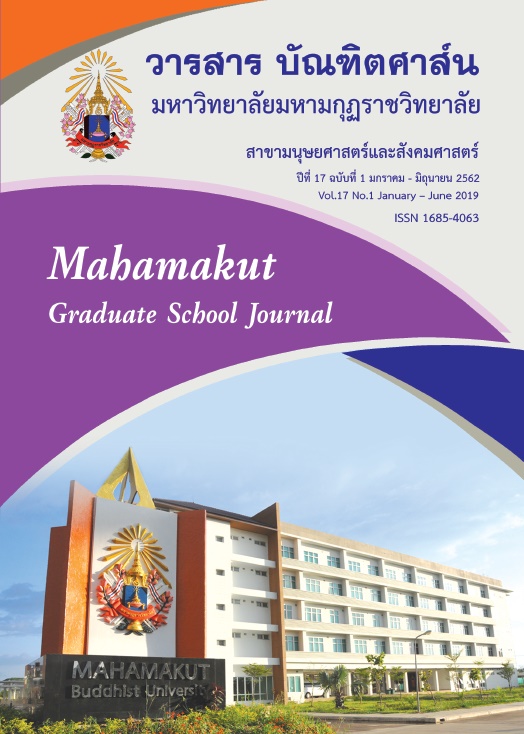ปัจจัยที่ส่งผลต่อผลสัมฤทธิ์ทางการเรียนวิชาภาษาอังกฤษ ของนักเรียนชั้นมัธยมศึกษาตอนต้น สังกัดสำนักงานเขตพื้นที่การศึกษา มัธยมศึกษา เขต 8
คำสำคัญ:
ผลสัมฤทธิ์, วิชาภาษาอังกฤษบทคัดย่อ
กำรวิจัยครั้งนี้มีวัตถุประสงค์เพื่อ (1) เพื่อศึกษำองค์ประกอบปัจจัยที่ส่งผลต่อผลสัมฤทธิ์ทำงกำรเรียนวิชำภำษำอังกฤษของนักเรียนชั้นมัธยมศึกษำตอนต้น สังกัดสำนักงำนเขตพื้นที่กำรศึกษำมัธยมศึกษำเขต 8 (2) เพื่อศึกษำอิทธิพลของปัจจัยที่ส่งผลต่อผลสัมฤทธิ์ทำงกำรเรียนวิชำภำษำอังกฤษของนักเรียนชั้นมัธยมศึกษำตอนต้น สังกัดสำนักงำนเขตพื้นที่กำรศึกษำ มัธยมศึกษำ เขต 8 โดยใช้ระเบียบวิธีกำรวิจัยแบบผสม (Mixed Method) ดำเนินกำรวิจัย 2
ระยะคือ ระยะที่ 1 ศึกษำองค์ประกอบปัจจัยที่ส่งผลต่อผลสัมฤทธิ์ทำงกำรเรียนวิชำภำษำอังกฤษของนักเรียนชั้นมัธยมศึกษำตอนต้น สังกัดสำนักงำนเขตพื้นที่กำรศึกษำ มัธยมศึกษำ เขต 8 เครื่องมือที่ใช้ในกำรเก็บข้อมูลเชิงคุณภำพเป็นแบบสัมภำษณ์เชิงลึก(In-depth Interview) ผู้ให้ข้อมูลสำคัญ คือ นักเรียนจำนวน 16 คน ได้จำกกำรเลือกแบบเจำะจง (Purposive Sampling) ระยะที่ 2 ศึกษำอิทธิพลของปัจจัยที่ส่งผลต่อ ผลสัมฤทธิ์ทำงกำรเรียนว ชำภำษำอังกฤษของนักเรียน ชั้นมัธยมศึกษำตอนต้น สังกัดสำนักงำนเขตพื้นที่กำร ศึกษำมัธยมศึกษำ เขต 8 เครื่องมือที่ใช้ในกำรเก็บ รวบรวมข้อมูลเป็นแบบสอบถำม กำหนดกลุ่มตัวอย่ำงแบบหลำยขั้นตอน (Multi-stage Sampling) ซึ่งเป็นนักเรียน จำนวนไม่น้อยกว่า 384 คน วิเคราะห์ข้อมูลโดยใช้ค่าความถี่ ค่าร้อยละ ค่าเฉลี่ย ค่าเบี่ยงเบนมาตรฐานวิเคราะห์สัมประสิทธิ์สหสัมพันธ์ วิเคราะห์การถดถอยพหุคูณ ผลการศึกษาวิจัย พบว่า1. องค์ประกอบปัจจัยที่ส่งผลต่อผลสัมฤทธิ์ทางการเรียนวิชาภาษาอังกฤษของนักเรียนชั้นมัธยมศึกษาตอนต้น สังกัดสำนักงานเขตพื้นที่การศึกษามัธยมศึกษา เขต 8 ประกอบด้วย เจตคติต่อการเรียนแรงจูงใจใฝ่สัมฤทธิ์ การเตรียมตัวก่อนเรียน การปฏิบัติตัวในชั้นเรียน การปฏิบัติตัวหลังเรียน การสนับสนุนของครอบครัว ครูผู้สอน2. อิทธิพลของปัจจัยตัวแปรอิสระ 7 ตัวที่ร่วมกันทำนายตัวแปรตาม (ผลสัมฤทธิ์ทางการเรียนวิชาภาษาอังกฤษ) สามารถอธิบายตัวแปรตามได้สูงมากเมื่อพิจารณาเฉพาะตัวแปร พบว่าตัวแปรอิสระที่สามารถอธิบายตัวแปรตามได้ดีที่สุดและมีนัยสำคัญ 3 ลำดับแรกได้แก่ เจตคติต่อการเรียนของผู้เรียน ครูผู้สอน และแรงจูงใจใฝ่สัมฤทธิ์ของผู้เรียน
เอกสารอ้างอิง
2.กระทรวงศึกษาธิการ. (2551). หลักสูตรการสึกษาขั้นพื้นฐาน พุทธศักราช 2551 สาระและมาตรฐานการเรียนรู้สังคมศึกษา ศาสนา และวัฒนธรรม. กรุงเทพฯซ องค์การรับส่งสินค้าและพัสดุภัณฑ์.
3.กาญจนา คุณารักษ์. (2534). พื้นฐานการพัฒนาหลักสูตร. นครปฐม: มหาวิทยาลัยศิลปากร.
4.กิ่งกาญจน์ ปานทอง. (2545). ปัจจัยที่ส่งผลต่อพฤติกรรมการเรียนของนักศึกษาตามโครงการจัดการศึกษาสำหรับบุคลากรประจำ คณะวิทยาการจัดการโปรแกรมวิชานิเทศศาสตร์ สถาบันราชภัฎพระนครกรุงเทพมหานคร.ปริญญานิพนธ์การศึกษามหาบัณฑิต. มหาวิทยาลัยศรีนครินทรวิโรฒ.
5.ณัชชารีย์ ทรัพย์เย็น. (2556). การศึกษาปัจจัยที่เกี่ยวข้องกับการเรียนภาษาอังกฤษเพื่อการสื่อสารของนักเรียนชั้น ปวช. ปีที่ 1 สาขาวิชาไฟฟ้าและอิเล็กทรอนิกส์ วิทยาลัยเทคโนโลยีดอนบอสโก ราชบุรี. รายงานการวิจัยวิทยาลัยเทคโนโลยีดอนบอสโก ราชบุรี.
6.ทิพวรรณ สุวรรณประเสริฐ. (2541). ตัวแปรที่เกี่ยวข้องกับพฤติกรรมการเรียนของนักเรียนชั้นมัธยมศึกษาตอนต้นกรมสามัญศกึ ษา จังหวัดปราจีนบุรี. ปริญญานิพนธ์การศึกษามหาบัณฑิต. มหาวิทยาลัยศรีนครินทรวิโรฒ.
7.ธงทอง จันทรางศุ. (2552). ข้อเสนอการปฏิบัติรูปการศึกษาในทศวรรษที่ 2 (พ.ศ.2552-2561). กรุงเทพ: พริกหวานกราฟฟิก.
8.ลัดดาวัลย์ เกษมเนตร และคณะ. (2539). ปัจจัยที่มีอิทธิพลต่อการมีวินัย. สถาบันวิจัยพฤติกรรมศาสตร์มหาวิทยาลัยศรีนครินทรวิโรฒ ประสานมิตร.
9.สัมพันธ์ พันธุ์พฤกษ์. (2553). การปฏิรูปการศึกษาในทศวรรษที่สอง. ขอนแก่น: ชัชวาลการพิมพ์
10.สำนักงานคณะกรรมการการศึกษาแห่งชาติ. (2530). แนวทางการประกัน คุณภาพภายในสถานศึกษาเพื่อพร้อมรับการประเมินภายนอก. กรุงเทพฯ: สกายบุกส์.
11.สำนักงานคณะกรรมการพัฒนาการเศรษฐกิจและสังคมแห่งชาติ. (2549). แผนพัฒนาเศรษฐกิจและสังคมแห่งชาติฉบับที่สิบ พ.ศ. 2550 - 2554. กรุงเทพฯ: โรงพิมพ์ คุรุสภาลาดพร้าว.
12.สำนักงานศึกษาธิการภาค 4. (2559). ปัจจัยที่ส่งผลต่อความสำเร็จในการเรียนภาษาอังกฤษของนักเรียน. ราชบุรี.
13.อัจฉรา สุขารมณ์. (2542). “EQ กับการเลี้ยงดูเด็ก” วารสารพฤติกรรมศาสตร์ ปีที่ 5, ฉบับที่ 1:1
14.เอนก เพิ่มวงศ์เสนีย์. (2555). สำนักงานเลขาธิการสภาการศึกษาแห่งชาติ. กรุงเทพ: กระทรวงศึกษาธิการ.
15.Horwitz, E.K. (2001). Language anxiety and achievement. Annual Review of Applied Linguistics,21, 112-126.
16.Karahan, F. (2007). Language attitudes of Turkish students towards the English language andits use in Turkish context. Journal of Arts and Sciences.73-87.
17.Klein, J.I. (1990). Feasibility theory: A resource-munificence model of work motivation and behavior.Academy of Management Review, 15, 646-665.
18.Masgoret, A.M. & Gardner, R.C. (2003). Attitudes, Motivation, and Second Language Learning:A Meta-Analysis of Studies Conducted By Gardner and Associates. Language Learning,53:1, 123-163
19.O’Malley, J.M. & Chamot, A.U. (1990). Learning Strategies in Second Language Acquisition.Cambridge: Cambridge University Press.
20.Oxford, R.L. (1990). Language Learning Strategies: What every teacher should know. New York:Newbury House/Harper Collins.
21.Pintrich, P.R., & Schunk, D.H. (1996). Motivation in education: Theory, research, and application.(2nd ed.). Upper Saddle River, NJ: Merrill Prentice Hall.
22.Sprat et al.(2005). The TKT teaching knowledge test course. Cambridge: Cambridge University press.
23.Stark, D., & Paltridge,B. (1996). A note on using sociolinguistic methods on study non-nativeattitudes towards English. World English. World Englishes, 15(2), 217-224.
24.Yu, Z. (2006). Acquisition of early literacy. Early Childhood Education, 322, 19-23.
ดาวน์โหลด
เผยแพร่แล้ว
รูปแบบการอ้างอิง
ฉบับ
ประเภทบทความ
สัญญาอนุญาต
บทความวิชาการและบทความวิจัยในวารสารฉบับนี้ถือเป็นความรับผิดชอบของผู้เขียนเท่านั้น บทความที่ได้รับการตีพิมพ์ในวารสารบัณฑิตศาส์น ถือเป็นลิขสิทธิ์ของมหาวิทยาลัยมหามกุฏราชวิทยาลัย ตามพระราชบัญญัติลิขสิทธิ์



